| Listing 1 - 9 of 9 |
Sort by
|
Book
ISBN: 8478823670 9788478823673 Year: 1999 Publisher: Madrid: Ediciones Clásicas,
Abstract | Keywords | Export | Availability | Bookmark
 Loading...
Loading...Choose an application
- Reference Manager
- EndNote
- RefWorks (Direct export to RefWorks)
Greek literature --- Women and literature --- Women domestics --- Domestics in literature. --- Women in literature.
Book
ISBN: 0719012961 Year: 1981 Publisher: Manchester Manchester university press
Abstract | Keywords | Export | Availability | Bookmark
 Loading...
Loading...Choose an application
- Reference Manager
- EndNote
- RefWorks (Direct export to RefWorks)
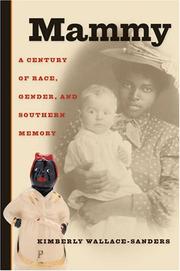
ISBN: 9780472116140 Year: 2008 Publisher: Ann Arbor Michigan University Press
Abstract | Keywords | Export | Availability | Bookmark
 Loading...
Loading...Choose an application
- Reference Manager
- EndNote
- RefWorks (Direct export to RefWorks)
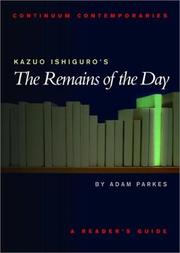
ISBN: 1283206161 9786613206169 1441149643 9781441149640 0826452310 9780826452313 Year: 2001 Publisher: New York : Continuum,
Abstract | Keywords | Export | Availability | Bookmark
 Loading...
Loading...Choose an application
- Reference Manager
- EndNote
- RefWorks (Direct export to RefWorks)
Continuum Contemporaries will be a wonderful source of ideas and inspiration for members of book clubs and readings groups, as well as for literature students.The aim of the series is to give readers accessible and informative introductions to 30 of the most popular, most acclaimed, and most influential novels of recent years. A team of contemporary fiction scholars from both sides of the Atlantic has been assembled to provide a thorough and readable analysis of each of the novels in question. The books in the series will all follow the same structure:a biography of the novelist, including oth
Master and servant in literature. --- Country homes in literature. --- Household employees in literature. --- Domestics in literature --- Ishiguro, Kazuo, --- Criticism and interpretation. --- Country homes in literature --- Household employees in literature --- Master and servant in literature --- LITTERATURE ANGLAISE --- 20E SIECLE --- HISTOIRE ET CRITIQUE
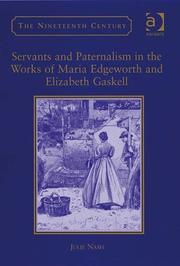
ISBN: 9780855489668 1138620513 1351126741 1351125605 1281208620 9786611208622 0754687481 9780754687481 9781351125604 9780754656395 075465639X 6611208623 1409489876 1351125982 1351126369 0815396988 9781351125987 9781351126748 Year: 2007 Publisher: Aldershot, England Burlington, VT Ashgate
Abstract | Keywords | Export | Availability | Bookmark
 Loading...
Loading...Choose an application
- Reference Manager
- EndNote
- RefWorks (Direct export to RefWorks)
Writing during periods of dramatic social change, Maria Edgeworth and Elizabeth Gaskell were both attracted to the idea of radical societal transformation at the same time that their writings express nostalgia for a traditional, paternalistic ruling class. Julie Nash shows how this tension is played out especially through the characters of servants in short fiction and novels such as Edgeworth's Castle Rackrent, Belinda, and Helen and Gaskell's North and South and Cranford, among others.
Household employees in literature. --- Social change in literature. --- Domestics in literature --- Edgeworth, Maria, --- Gaskell, Elizabeth Cleghorn, --- Author of Mary Barton, --- Gaskell, E. C. --- Gaskell, Elizabeth, --- Gaskell, Elizabeth Cleghorn Stevenson, --- Gaskell, --- Mills, Cotton Mather, --- Stevenson, Elizabeth, --- Gaskell, Isabel C., --- Stevenson, Elizabeth Cleghorn, --- Edgeworth, --- Author of Practical education, --- Practical education, Author of, --- Author of Letters for literary ladies, --- Letters for literary ladies, Author of, --- Edgeworth, Eliza, --- Criticism and interpretation.
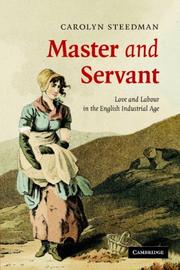
ISBN: 9780521697736 9780521874465 0521697735 0521874467 9786610959693 0511295782 0511294212 0511573820 0511618948 128095969X 051129655X 0511295014 9780511618949 1107181658 9780511296550 0511292619 9780511292613 9780511295782 9780511294211 9780511295010 6610959692 9781107181656 9780511573828 Year: 2007 Volume: 10 Publisher: Cambridge New York Cambridge University Press
Abstract | Keywords | Export | Availability | Bookmark
 Loading...
Loading...Choose an application
- Reference Manager
- EndNote
- RefWorks (Direct export to RefWorks)
Leading historian Carolyn Steedman offers a fascinating and compelling account of love, life and domestic service in eighteenth-century England. This book, situated in the regional and chronological epicentre of E. P. Thompson's The Making of the English Working Class and Emily Bronte's Wuthering Heights, focuses on the relationship between a Church of England clergyman (the Master of the title) and his pregnant maidservant in the late eighteenth century. This case-study of people behaving in ways quite contrary to the standard historical account sheds new light on the much wider historical questions of Anglicanism as social thought, the economic history of the industrial revolution, domestic service, the poor law, literacy, education, and the very making of the English working class. It offers a unique meditation on the relationship between history and literature and will be of interest to scholars and students of industrial England, social and cultural history and English literature.
Household employees in literature --- Master and servant in literature --- Labor --- Master and servant --- Industrial revolution --- Employés de maison dans la littérature --- Employeur et employé dans la littérature --- Travail --- Employeur et employé (Droit) --- Révolution industrielle --- History --- Histoire --- Great Britain --- Grande-Bretagne --- Social conditions --- Conditions sociales --- Domestics in literature --- Master and servant in literature. --- Geschiedenis van opvoeding en onderwijs --- England --- handboeken en inleidingen --- Arts and Humanities --- handboeken en inleidingen. --- Employés de maison dans la littérature --- Employeur et employé dans la littérature --- Employeur et employé (Droit) --- Révolution industrielle --- Revolution, Industrial --- Economic history --- Social history --- Contracts --- Hire --- Labor and laboring classes --- Manpower --- Work --- Working class --- Law and legislation --- Household employees in literature.
Book
ISBN: 9781776143528 1776143523 1776143515 9781776143511 9781776144594 1776144597 Year: 2019 Publisher: Johannesburg : Wits University Press,
Abstract | Keywords | Export | Availability | Bookmark
 Loading...
Loading...Choose an application
- Reference Manager
- EndNote
- RefWorks (Direct export to RefWorks)
More than a million black South African women are domestic workers. These nannies, housekeepers and chars continue to occupy a central place in in postapartheid society. But it is an ambivalent position. Precariously situated between urban and rural areas, rich and poor, white and black, these women are at once intimately connected and at a distant remove from the families they serve. 'Like family' they may be, but they and their employers know they can never be real family. Ena Jansen shows that domestic worker relations in South Africa were shaped by the institution of slavery at the Cape. This established social hierarchies and patterns of behaviour and interaction that persist to the present day, and are still evident in the predicament of the black female domestic worker. To support her argument, Jansen examines the representation of domestic workers in a diverse range of texts in English and Afrikaans. Authors include André Brink, JM Coetzee, Imraan Coovadia, Nadine Gordimer, Elsa Joubert, Antjie Krog, Sindiwe Magona, Kopano Matlwa, Es'kia Mphahlele, Sisonke Msimang, Zukiswa Wanner and Zoë Wicomb. Later texts by black authors offer wry and subversive insights into the madam/maid nexus, capturing paradoxes relating to shifting power relationships. Like Family is an updated version of the award-winning Soos familie published in 2015 and the highly-acclaimed 2016 Dutch translation, Bijna familie.
Women household employees --- South African literature --- Household employees in literature. --- Housemaids --- Maids, House --- Women domestics --- Women servants --- Household employees --- Domestics in literature --- History. --- History and criticism. --- In literature. --- Household employees. --- Afrikaans literature. --- South African literature. --- South African literature (English) --- Women household employees. --- SOCIAL SCIENCE --- Afrikaans literature --- Sociology --- General. --- Regional Studies. --- Anthropology --- South Africa. --- Domestic employees --- Domestic service employees --- Domestic service workers --- Domestics --- Household staff --- Household workers --- Servants --- Service employees, Domestic --- Service workers, Domestic --- Employees --- Behavioral sciences --- Human sciences --- Sciences, Social --- Social science --- Social studies --- Civilization --- English literature --- South African literature (Afrikaans) --- Africa, South
Book
ISBN: 9780801890499 0801890497 0801895111 9780801895111 Year: 2009 Publisher: Baltimore, Md Johns Hopkins University Press
Abstract | Keywords | Export | Availability | Bookmark
 Loading...
Loading...Choose an application
- Reference Manager
- EndNote
- RefWorks (Direct export to RefWorks)
In examining the interpersonal relationships between the different classes, she offers new ways in which to understand sexuality and gender in the eighteenth century.
History of civilization --- anno 1700-1799 --- Great Britain --- English literature --- Household employees in literature --- Master and servant in literature. --- Social classes in literature. --- Group identity in literature. --- Gender identity in literature. --- Household employees --- Families --- Littérature anglaise --- Employés de maison dans la littérature --- Employeur et employé dans la littérature --- Classes sociales dans la littérature --- Identité collective dans la littérature --- Identité sexuelle dans la littérature --- Employés de maison --- Familles --- History and criticism. --- Social conditions --- Economic aspects --- History --- Histoire et critique --- Conditions sociales --- Aspect économique --- Histoire --- Littérature anglaise --- Employés de maison dans la littérature --- Employeur et employé dans la littérature --- Classes sociales dans la littérature --- Identité collective dans la littérature --- Identité sexuelle dans la littérature --- Employés de maison --- Aspect économique --- Household employees in literature. --- Family --- Family life --- Family relationships --- Family structure --- Relationships, Family --- Structure, Family --- Social institutions --- Birth order --- Domestic relations --- Home --- Households --- Kinship --- Marriage --- Matriarchy --- Parenthood --- Patriarchy --- Domestic employees --- Domestic service employees --- Domestic service workers --- Domestics --- Household staff --- Household workers --- Servants --- Service employees, Domestic --- Service workers, Domestic --- Employees --- Domestics in literature --- Social aspects
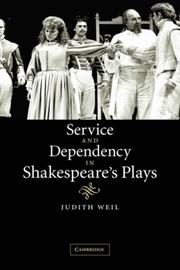
ISBN: 0521844053 9780521844055 9780511484063 9780521101059 0511115679 9780511115677 0511115121 9780511115127 0511122101 9780511122101 0511484062 1280202858 9781280202858 0521101050 9786610202850 6610202850 1107151864 0511199112 0511326807 Year: 2005 Publisher: Cambridge Cambridge University Press
Abstract | Keywords | Export | Availability | Bookmark
 Loading...
Loading...Choose an application
- Reference Manager
- EndNote
- RefWorks (Direct export to RefWorks)
This is an unusual study of the nature of service and other types of dependency and patronage in Shakespeare's drama. By considering the close associations of service with childhood or youth, marriage and friendship, Judith Weil sheds light on social practice and dramatic action. Approached as dynamic explorations of a familiar custom, the plays are shown to demonstrate a surprising consciousness of obligations, and a fascination with how dependants actively change each other. They help us understand why early modern people may have found service both frightening and enabling. Attentive to a range of historical sources, and social and cultural issues, Weil also emphasises the linguistic ambiguities created by service relationships, and their rich potential for interpretation on the stage. The book includes close readings of dramatic sequences in twelve plays, including Hamlet, Macbeth, The Taming of the Shrew and King Lear.
Shakespeare, William --- Master and servant --- Household employees --- Dependency (Psychology) in literature. --- Master and servant in literature. --- Household employees in literature. --- Domestics in literature --- Domestic employees --- Domestic service employees --- Domestic service workers --- Domestics --- Household staff --- Household workers --- Servants --- Service employees, Domestic --- Service workers, Domestic --- Employees --- Contracts --- Hire --- History --- Law and legislation --- Shakespeare, William, --- Shakespear, William, --- Shakspeare, William, --- Šekʻspiri, Uiliam, --- Saixpēr, Gouilliam, --- Shakspere, William, --- Shikisbīr, Wilyam, --- Szekspir, Wiliam, --- Šekspyras, --- Shekspir, Vilʹi︠a︡m, --- Šekspir, Viljem, --- Tsikinya-chaka, --- Sha-shih-pi-ya, --- Shashibiya, --- Sheḳspir, Ṿilyam, --- Shaḳspir, Ṿilyam, --- Syeiksŭpʻio, --- Shekspir, V. --- Szekspir, William, --- Shakespeare, Guglielmo, --- Shake-speare, William, --- Sha-ō, --- Şekspir, --- Shekspir, Uiliam, --- Shekspir, U. --- Šekspir, Vilijam, --- Ṣēkspiyar, Viliyam, --- Shakspir, --- Shekspyr, Vyli︠e︡m, --- Şekspir, Velyam, --- Ṣēkspiyar, Villiyam, --- Shēkʻspʻiyr, Vlilliam, --- Ṣēkspiyar, --- Ṣēkspiyar Mahākavi, --- Ṣēkspiyar Mahākaviya, --- Sheḳspier, Ṿilyam, --- Shēkʻspir, --- Shakespeare, --- Śeksper, --- Шекспир, Вильям, --- Шекспир, Уильям, --- שייקספיר, וויליאם, --- שייקספיר, וו., --- שיקספיר, וויליאם --- שיקספיר, ויליאם --- שיקספיר, ויליאם, --- שכספיר, ויליאם, --- שכספיר, וילים, --- שכספיר, ו׳ --- שעפקספיר, וויליאם, --- שעקספיער, וויליאם --- שעקספיער, וויליאם, --- שעקספיער, ווילליאם --- שעקספיער, וו., --- שעקספיר --- שעקספיר, וו --- שעקספיר, וויליאם, --- שעקספיר, וויליאמ --- שעקספיר, ווילליאם --- שעקספיר, ווילליאם, --- שעקספיר, וו., --- שעקספיר, װיליאם, --- שעקספיר, װילליאם, --- שעקספיר, װ., --- שעקספער --- שעקספער, וויליאמ --- שקספיר --- שקספיר, וו --- שקספיר, וויליאם --- שקספיר, וויליאם, --- שקספיר, ווילים, --- שקספיר, וילאם --- שקספיר, ויליאם --- שקספיר, ויליאם, --- שקספיר, ויליים, --- שקספיר, וילים --- שקספיר, וילים, --- شاكسبير، وليم --- شاكسپير، وليم --- شكسبير، وليام --- شكسبير، وليم --- شكسبير، وليم، --- شكسبير، و. --- شكسپير، وليم --- شكسپير، ويليام --- شيكسبير، وليام --- شيكسبير، وليام.، --- شيكسبير، وليم --- شکسبير، وليم --- وليم شکسبير --- 沙士北亞威廉姆, --- 沙士比亞威廉姆, --- 莎士比亞威廉姆, --- 莎士比亞威廉, --- 莎士比亞, --- Characters --- Household employees. --- Arts and Humanities --- Literature
| Listing 1 - 9 of 9 |
Sort by
|

 Search
Search Feedback
Feedback About UniCat
About UniCat  Help
Help News
News